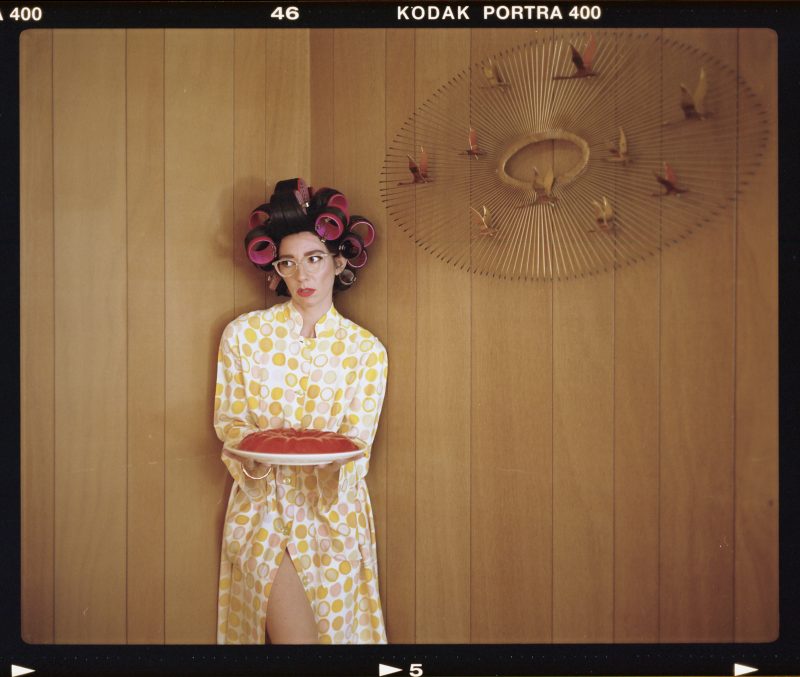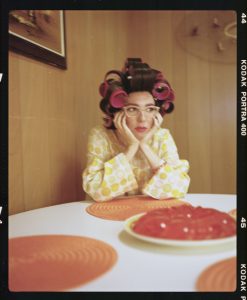Q&A: Suzannah Powell fuses her two personalities as rapper Boyfriend

Suzannah Powell of Boyfriend. Courtesy: Sophie Berard.
In a world where musicians are constantly having to one-up what they’ve done in the past, the job becomes even harder for smaller independent artists; those who not only make music but distribute it and arrange their tours and production.
Big Freedia, Low Cut Connie, Boyfriend
8 p.m., Tuesday, Nov. 19
The UC Theatre, Berkeley
Tickets: $30.
“It’s part of the anxiety of this onward-and-upward-focused culture that we live in,” said rapper Suzannah Powell, better known as Boyfriend. The first time the New Orleans artist was at Outside Lands, in 2017, Rolling Stone dubbed her outlandish performance, full of lingerie and skin, as one of the festival’s best.
“Everybody’s, like, ‘What’s the next thing? More, more, more, more!’ … So I decided that I wasn’t going to care about that because if I was going to think about it I’d go crazy,” said Powell, whose socially conscious songs and subversive image were again outlandish when she returned to the music festival last summer. She used the opportunity to debut a couple of songs, model some new retro-modern accessories like a new eyeglasses chain—“I’ve decided that’s my new signature thing”—and carouse with her dancers.
The 31-year-old is a Nashville native and the daughter of country singer-songwriter Monty Powell. She said she grew up in a conservative home. In fact, all four of her grandparents passed away not knowing of her bourgeoning music career.
After graduating from UCLA with a degree in creative writing, she first worked in television production in Los Angeles. That job fed into her music career, but not in the way most would assume. It taught her how to manage the Boyfriend business, which she does with the help of a manager. She learned networking, building lists, making cold calls or writing emails.
“I don’t have a record deal or a publishing deal,” she said. “I enjoy that aspect of it. … I actually think I’m more of whichever side of the brain is analytical. When I sit down at a computer, my instinct is actually to write an email or make a spreadsheet; not write a song. So I’m lucky that I had that kind of career to prepare me for that.”
Eventually she moved back to the South and became a school teacher. That’s when she started developing her Boyfriend character—a curlers- and lingerie-wearing provocateur.
Hidden behind her extremely bouncy song production and eye-catching aesthetics are themes of what it means to be a woman today. She raps about gender roles, sexism, the patriarchy, body positivity and sex affirmation.
Powell is careful to avoid calling her music “hip-hop.” Instead, she settled on referring to it as rap cabaret. That’s because while she may spit fast rhymes, she doesn’t share in cultural aspect of what inspired the genre—the African American experience.
“We all deal with connotations, which are different than definitions,” she said. “For me the connotation for hip-hop has a social identity thing attached to it that I wouldn’t say applies in my case.”
Since releasing her first track as Boyfriend in 2012, she made several EPs with New Orleans production duo Sex Party and collaborated with “Bounce Queen” Big Freedia (with whom she’ll pass through the Bay Area next).
Boyfriend’s 2017 EP was co-produced by Pablo Dylan (Bob Dylan’s grandson).
“Sometimes you’re just yelling into the void, and sometimes the void answers back and it’s Pablo Dylan, and you get an amazing EP out of it,” she said.
Last year she released single “Was That,” a track inspired by Rodgers and Hammerstein’s “I’m Gonna Wash That Man Right Out of My Hair,” from the musical “South Pacific”—which tackles what many women deal with to make themselves presentable to men. And in 2019, she’s trying to release a new song every month.
Powell eventually gave up teaching and no longer has to worry about getting discovered by her students and potentially losing her job. As far as she knows, none of her students has ever seen her in her skimpy stage outfits and rapping like a sailor. She’s also fused her two true selves and doesn’t shy away from sharing her many sides to people.
“People are always trying to oversimplify each other,” she said. “We’re very complex human beings. The same person that takes care of a little tiny baby can fuck like an animal and that’s OK for that person to exist. You don’t have to compartmentalize.”
RIFF: You were a teacher at the same time as you were creating the Boyfriend persona. Did the character ever come out in front of your students?
Boyfriend: The teaching informed the performing, and the performing informed the teaching. They were kind of parallel developments, because I was, on my nights and weekends, creating these songs and making music videos and getting on whatever stage would have me. But in the daytime, my job was commanding a classroom full of kids, and it turns out commanding a room full of drunk people isn’t that much different.
The kids never knew about it, and that’s part of the catalyst for me to go only by Boyfriend and keep my legal name a secret. Because when I first started, my actual job would have been at risk. You know how some people are. They see a teacher drinking a beer and they’re like, “Oh my God you’re a human being! You’re fired.” The school that I grew up going to [in Nashville] was a fucked-up Christian school where if they—literally—saw a teacher drinking alcohol out at dinner with their wife; having a glass of wine or something—they could be fired over that.” …
I was terrified that the kids would find a video online. … It’s not that they would hear the things I was saying. Some of them are young, but everyone is exposed to things these days—just listen to the radio. It was that I didn’t want them to think that they suddenly didn’t actually know me. The same was true of my family. I kept it secret from a lot of my family members. In fact, all four of my grandparents died never knowing about this because I was afraid that they would suddenly question our entire relationship once they knew that this facet of me existed.
How did you discover you had a knack for this style of music? Did you grow up listening to it, and how did that go over with your parents?
I definitely did grow up listening to it all the time; not even in secret from my parents. I’m born late enough that rap and hip-hop were and are mainstream music. That’s the music we’re consuming. So I’ll listen to Nelly right alongside Dixie Chicks, right alongside Three 6 Mafia, right alongside N’Sync.
What drew me to it originally was the sheer amount of words that you could build into one song. When you’re singing, you could maybe get a fourth as many words in. Because they’re [in sing-song voice] “drawwwwwwn ouuuuuut!” … It was really fun for me to cram as much in there as you can. That’s like the English major thing—reading and writing. That’s what I was good in at school, and that’s basically what makes you good at rap.
The songs pull on a lot of social commentary. It must take a lot of work to balance the serious with the entertaining and comedic. How do you do that?
I’m not sure that I do, to be honest. Sometimes I don’t even want to go on my Instagram to post, or write a song because it feels so narcissistic, you know? Other days I feel so lucky to have a platform from which to speak about these things. So just like any other person living in this era, you have days where you feel hopeful, and then you have days where you feel hopeless. I’m the same way. And I’m not always sure that the ways in which I’m engaging with the world is necessarily the right away. So, “pffft.” That would be my response. I think balancing is the balance—allowing it to teeter from one side to the other.
Where do you get your elaborate set costumes?
You won’t believe me, but honestly, most of them are hand-me-downs from my mom, my aunts, my great-aunts, my grandma. I’m kind of the clothes historian of my family. My sister can get the china and the nice silverware and all that furniture and shit. I get the clothes.
What would your grandma think about you wearing her dresses for this type of act?
I don’t know how she’d feel. My Momma Joy was really obsessed with musicals and fame. She was in pageants and all that stuff. I would like to believe that wherever she is now, the veil of some of the really conservative Christian upbringing that she had has been lifted because she’s on the other side of all the shit that we point at each other when we’re in our mortal form. … I would like to believe that when we die, we’re like, “Ohhhhhhh! My bad!” I would love to believe she sees the beauty in it. She was always one for, “Is it gonna be televised?!” So I hope she’s excited that yes, I have been televised, and [that she] can see past the skimpiness of it or the cuss words.
Have you spent much time in the Bay Area before? Have you had any memorable experiences here?
I try to play in San Francisco six times a year. I’m based in New Orleans but I play more here. …
My very first time here was [to run] Bay to Breakers, and it’s hard to beat that. This would have been 2007. … The city, the eucalyptus smells, the architecture—I love the fact that you can look and see a certain time; the hills are scary but beautiful, magic and witchy.
Follow editor Roman Gokhman at Twitter.com/RomiTheWriter.

